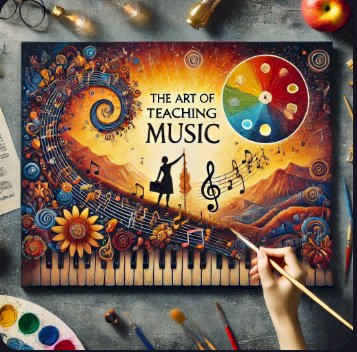The Art of Teaching Music: A Journey of Passion, Creativity, and Impact"
Explore the art of teaching music and how it blends passion, creativity, and skill. Discover the impact of music education and the journey of inspiring students through the power of music.

Introduction
Teaching music is a harmonious blend of artistry, discipline, and education. It is an extraordinary journey that allows educators to share their passion for music, nurture the talents of their students, and shape the next generation of musicians. This blog explores the enchanting world of teaching music, highlighting its importance, challenges, and the incredible rewards it brings.
The Power of Music Education
Music education is a vital component of a well-rounded curriculum. It offers numerous cognitive, emotional, and social benefits. Here are some of the ways teaching music can positively impact students:
-
Cognitive Development: Music education enhances critical thinking skills, problem-solving abilities, and memory. Learning to read musical notation and play an instrument requires mental agility and discipline.
-
Emotional Expression: Music provides a powerful outlet for emotional expression. Students can convey their feelings and experiences through the notes they play or sing, fostering emotional intelligence.
-
Creativity and Innovation: Music encourages creativity and innovation. It allows students to experiment, compose, and explore new sounds, helping them develop as independent thinkers.
-
Teamwork and Collaboration: Ensemble playing teaches students to work collaboratively, enhancing their social and communication skills. They learn to listen, adapt, and synchronize with fellow musicians.
-
Cultural Awareness: Music is a universal language that transcends borders. Through music education, students gain a deeper appreciation for diverse cultures and traditions.
Challenges in Teaching Music
While teaching music is immensely rewarding, it comes with its fair share of challenges:
-
Budget Constraints: Many schools struggle with limited budgets for music programs, making it challenging to provide adequate resources and instruments.
-
Time Constraints: Balancing music instruction with other academic subjects can be a challenge, as teachers often have limited time for each class.
-
Diverse Learning Styles: Students have varying levels of musical aptitude and learning styles. Teachers must adapt their methods to cater to individual needs.
-
Motivation and Engagement: Keeping students motivated and engaged in music can be challenging, especially as they progress through various levels of difficulty.
-
Assessment: Evaluating musical progress and assessing performance can be subjective, making it important for teachers to develop fair and effective assessment methods.
The Rewards of Teaching Music
Despite the challenges, teaching music is a deeply fulfilling profession. Here are some of the rewards that music educators experience:
-
Witnessing Growth: Seeing students progress from beginners to accomplished musicians is a source of immense pride and joy.
-
Inspiring Passion: Music teachers have the power to ignite a lifelong passion for music in their students, which can bring them joy throughout their lives.
-
Building Connections: Music educators form meaningful connections with their students, fostering a sense of trust and mentorship.
-
Sharing the Joy of Music: Introducing students to the beauty of music and witnessing their appreciation for it is a heartwarming experience.
-
Lifelong Learning: Teaching music is a continuous learning journey. Educators stay engaged with their craft, exploring new techniques and repertoire.
Conclusion
Teaching music is a noble pursuit that enriches the lives of both educators and students. It is a journey of passion, creativity, and dedication that shapes individuals and communities alike. Despite the challenges, music educators continue to inspire the next generation of musicians, ensuring that the world remains filled with the beautiful harmonies of music for generations to come.

 Ashish Kumar
Ashish Kumar 












